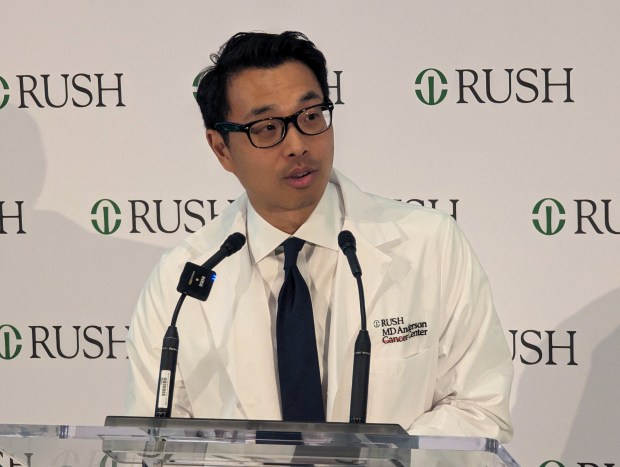Rush Copley Medical Center in Aurora will now be offering “world-class” cancer care after a recently announced partnership with The University of Texas MD Anderson Cancer Center, according to hospital officials.
At a ceremony announcing the partnership to Rush Copley Medical Center staff on Friday, Dr. Ying Zhang said the hospital’s cancer patients will get the same care as they would at the Rush University Medical Center in Chicago or at the MD Anderson Cancer Center in Houston, Texas. Zhang is a radiation oncology specialist at Rush Copley and the hospital’s cancer service line medical director.
“With this partnership, our aim is to become the destination cancer program in the western suburbs, delivering world-class care but still with that compassionate, personal and neighborly touch,” he said in his remarks. “With Rush MD Anderson Copley, we aim to not just improve cancer care, but transform it.”
The partnership between Rush University System for Health, one of the Chicago area’s largest health care systems, and MD Anderson, one of the top cancer centers in the nation, was announced at locations across the Rush system on Friday.
Each of the health system’s cancer centers, which are located at the Rush University Medical Center in Chicago, the Rush Copley Medical Center in Aurora, the Rush Oak Park Hospital and the Rush Copley Healthcare Center in Yorkville, will now be Rush MD Anderson Cancer Centers.
At the Rush Copley Medical Center in Aurora on Friday, a live band played as doctors, nurses and other hospital employees filled the main lobby. The hustle and bustle of hospital business continued around and through the crowd as a number of hospital officials spoke about the significant impact the partnership would have on the hospital’s cancer care.
“This collaboration represents a significant step forward in our mission to deliver exceptional care,” John Diederich, president and CEO of Rush Copley Medical Center, said in his remarks.
Speaking after the announcement ceremony, Zhang said that the partnership marks a “monumental change” in the way the hospital does cancer care. Over the last almost four years, Rush and MD Anderson have been working together to take a look at every piece of Rush’s cancer program to improve and integrate each piece into a larger system, he said.
For patients, this means they will receive individualized care from teams specializing in the type of cancer they have, according to Diederich. He said during his remarks that patients will also have access to a large number of treatment options, including experimental treatments and select clinical trials, at their local hospital.
These specialized teams of doctors for specific cancer types will work across the Rush system, according to Zhang, to ensure patients receive the same quality of care regardless of which location they visit to get their cancer treated. These teams collaborate to care for their patients, which he said will lead to quicker times for treatment and improved outcomes.
The collaboration with MD Anderson will also allow doctors from both health systems, Rush and MD Anderson, to work hand-in-hand, Zhang said.
“It’s a chance to learn from the best in the world and bring that knowledge back to our community,” he said.
While there have been big changes to the way cancer care is done at Rush Copley Medical Center, Zhang said the center is retaining its staff.
“What drew me to Copley, initially, was the clear commitment to exceptional, quality care,” Zhang said. “What kept me here, however, is the compassionate, personal and neighborly way that we treat our patients.”
rsmith@chicagotribune.com





